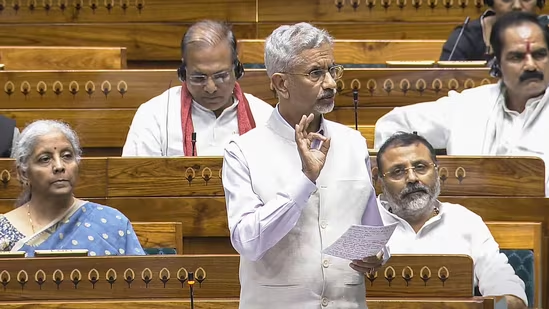
Jaishankar
During a heated debate in the Lok Sabha, External Affairs Minister Dr. S. Jaishankar launched a direct and pointed attack on the Congress party’s legacy on China, accusing it of making secret deals, strategic blunders, and failing to stand up to Beijing during critical moments in India’s history. Jaishankar’s sharp remarks were part of a larger discussion on India’s foreign policy, and specifically the ongoing India-China border tensions.
The seasoned diplomat-turned-politician pulled no punches as he addressed Congress leaders, firmly placing responsibility on their shoulders for what he termed a “historical mishandling” of China-related issues.
‘Didn’t go for Olympics, but signed secret deals’
In one of the most striking moments of the session, Jaishankar referred to the 2008 Beijing Olympics to expose what he alleged was Congress’s double standard and behind-the-scenes diplomacy with China. He said:
“We didn’t go for the Beijing Olympics because of our stance on Tibet. But you [Congress] not only went, you also signed secret Memorandums of Understanding (MoUs) with the Communist Party of China. What were those MoUs about? Why weren’t they disclosed to the people of India?”
This remark was aimed directly at the 2008 agreement signed between the Indian National Congress and the Communist Party of China (CPC) during UPA rule — an MoU that has often been criticized by the BJP for lacking transparency.
Jaishankar Questions Congress’s Silence on Chinese Incursions
Jaishankar also accused the Congress of remaining silent and inactive during several incidents of Chinese incursions in Indian territory. He cited past episodes, including the 2013 Depsang standoff and other transgressions that occurred under UPA governments.
“When Chinese troops came into Indian territory in 2013, what did you do? Did you send them back? Did you raise your voice internationally? No — you downplayed the situation, because confrontation was not your way,” he said.
He went on to assert that the current government has “responded strongly” to border violations, including the Galwan Valley clash in 2020, and has ensured robust infrastructure development and military preparedness in border areas.
‘Who diluted India’s position on Tibet and Taiwan?’
In a further rebuke of Congress’s China policy, Jaishankar accused the party of weakening India’s traditional diplomatic leverage.
“It was during your time that India softened its position on Tibet. You compromised strategic ground that earlier governments had cautiously preserved. You gave up our advantage without gaining anything substantial in return.”
The Foreign Minister reminded the House that issues like Tibet and Taiwan were once used by India as part of its broader diplomatic balancing act, but Congress governments chose to abandon that approach without national consensus.
‘We Don’t Do Secret Diplomacy’
Contrasting the BJP-led government’s approach, Jaishankar said, “We are not a government of secrecy and appeasement. Our foreign policy is firm, open, and in the national interest.” He added that Prime Minister Narendra Modi has consistently taken a strong stand on the Line of Actual Control (LAC), ensuring that China knows India will not be bullied.
“We’re building roads, helipads, bridges. We’re sending a message — this is India’s land and India will defend it,” he said.
Congress Retaliates: ‘Don’t Politicize Foreign Policy’
Congress leaders responded by accusing Jaishankar of politicizing foreign policy issues and diverting attention from the present government’s own challenges in dealing with China.
Congress MP Manish Tewari asked, “Why is the Foreign Minister talking about 2008 when the real question is — why has China occupied thousands of square kilometers of land since 2020?”
Another senior leader accused the BJP of failing to push China back despite tall promises and claimed that talks have not yielded any meaningful disengagement in several strategic areas.
Jaishankar’s Message: Don’t Rewrite History, Acknowledge the Truth
Wrapping up his speech, Jaishankar said that foreign policy cannot be debated in isolation from history. “You cannot talk about the present without owning up to the past,” he declared. He called on the Opposition to be honest about past failures, particularly when questioning the current government’s handling of China.
He also made it clear that India’s approach going forward would be based on strength, transparency, and strategic clarity, unlike what he described as the “uncertain and opaque legacy” left by Congress.
Conclusion: Foreign Policy as Political Flashpoint
Jaishankar’s remarks in the Lok Sabha underline the growing politicization of foreign policy in India. While the ruling BJP projects itself as bold and uncompromising on national security, the Congress accuses it of “chest-thumping without substance.” The debate on China is likely to remain a flashpoint in upcoming elections, with both sides defending their records and attacking the other.
As India navigates a tense and complex relationship with its northern neighbor, one thing is clear: the shadow of history looms large over its diplomacy, and political accountability is now a central part of the foreign policy conversation.
Thanks For Reading